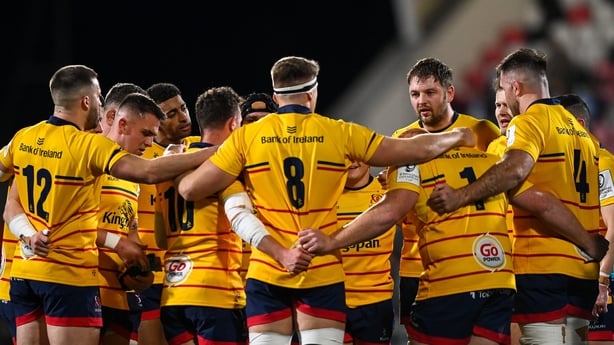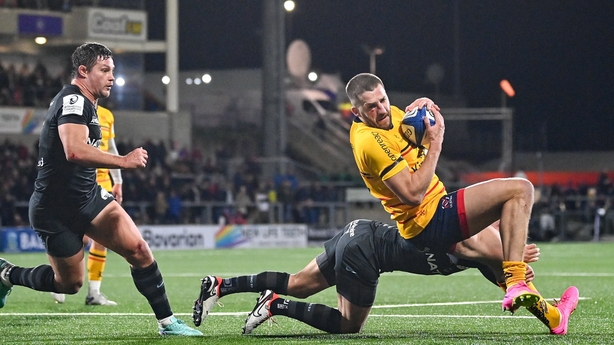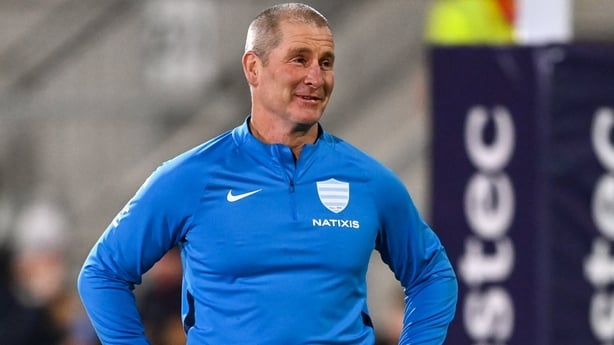It may be that necessity is the mother of invention, but Dan McFarland says Ulster had always planned to use their special op moves in the win over Racing 92.
The head coach hailed the 31-15 Investec Champions Cup win as the best of a patchy season so far but admitted that the lineout was far from perfect with five going astray early on.
However, such was their dominance over the Top14 leaders in the opening half, Ulster scored three tries, the first two coming off tap penalties.
The first and their fourth of the night, both scored by Nick Timoney, came via open-play mauls after tap penalties and looked unstoppable.
The second came via John Cooney tapping the ball directly to an on-rushing Timoney before Stuart McCloskey finished.
McFarland said that losing the early lineouts didn't factor into the decision to use the trick plays.
"We were planning to use those moves anyway," he told RTÉ Sport.
"It was just handy at the time that we didn’t have to kick to the corner.
"The lineout we found difficult, and we probably got our strategy a little bit wrong in the first five but fair play, Hendy [Iain Henderson] and Rob [Herring] and Al [O’Connor] worked it out, changed the tactics in there and managed to win them from then on.
"Obviously, you can’t practice that [Cooney to Timoney kick-pass] at full bore but it was timed perfectly, and we got the little bit of punch that we needed to be able to open up a little bit of space."

He added: "We were chatting at the start of the week about tap penalty moves close to the line. We've got a lot of guys who think a lot about stuff like that.
"It was Hendy who said 'why don't we do a maul off a tap penalty, we've got a really good maul', and I said 'yeah, let's go for it'.
"We apportioned a time at the end of training to 'laboratories' where we test it. You take the idea into the laboratory, you all stand around, the forwards got there, one of the scrum-halves has to suffer listening to it.
"We talk through the detail, I'm really into that kind of stuff, I love the detail around that.
"We talk about what-ifs, what the players might do, we talk to the referees about whether we are allowed to do that kind of stuff so then we go away and we decide if we're going to put it into practice.
"I was wondering whether we do one or both and, to be fair, Hendy said, 'let's do both' and they both worked."

Player of the match McCloskey (above) was delighted to get involved for the second try once the ball came back from the pack close to the line.
"My try, it was pretty off the cuff," he said.
"Cooney gave me a good ball, I’m not sure who was ahead of me, it could have been [Nolann] Le Garrec, and I think I’ve got about 40 kilos on him, so it’s a bit handier when it’s like that.
"In attack, you’d love to say it’s easy, you’re sticking to a plan and you know it’s going to work eventually, but I’ve had doubts the last few weeks when it wasn’t working and I’m sure other people had doubts.
"The coaches and senior players are sticking with it and knowing eventually it will turn."

Racing 92 boss Stuart Lancaster (above) was part of a Leinster set-up over the last few years that had become specialists at tap penalty plays and had to admire the innovative nature of the tries.
"The options are endless, aren’t they," he said after the match, his first journey back to Irish soil after seven seasons with Leinster.
"What you find is that teams that have been together a long time, like Leinster, Harlequins last week, Ulster this week...you are not building the foundations of your game because the coaching team and players have been together a long time.
"Ulster clearly understand what they are doing, and on days like today they can raise their game with the crowd behind them to another level.
"So you have to be as good as them in the cohesion part and we weren’t."


